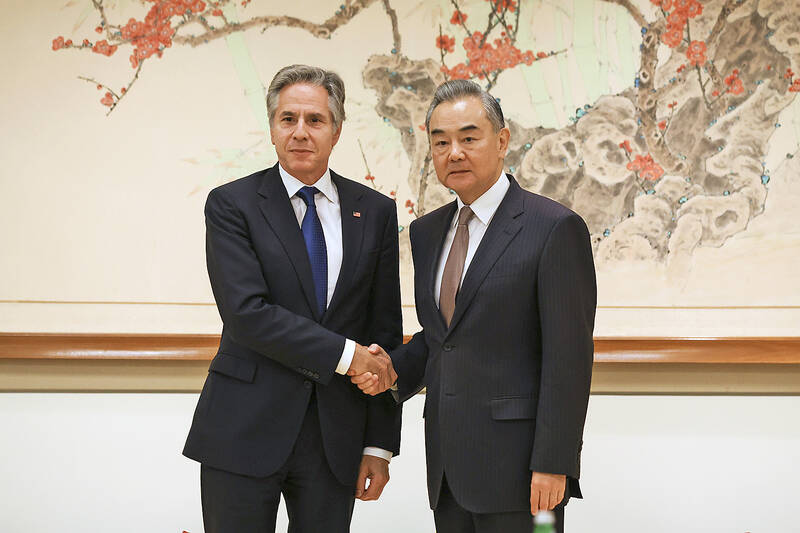The Ministry of Foreign Affairs (MOFA) yesterday thanked US Secretary of State Antony Blinken for emphasizing the importance of maintaining peace and stability across the Taiwan Strait and condemning China’s actions that threaten the region’s peaceful “status quo” during his meeting with Chinese Minister of Foreign Affairs Wang Yi (王毅) on Friday.
Blinken met with Wang on the sidelines of the 79th UN General Assembly in New York City, where he stressed “the importance of maintaining peace and stability across the Taiwan Strait,” the US Department of State said in a news release.
Blinken also raised concerns about the People’s Republic of China’s (PRC) “dangerous and destabilizing actions in the South China Sea” and “PRC support for Russia’s defense industrial base and war of aggression against Ukraine,” it said.

Photo: AP
The ministry said it welcomes and appreciates US senior officials reaffirming their firm position and support for maintaining peace and stability across the Taiwan Strait during interactions with Chinese officials.
It also condemned China for continuing to threaten the peaceful “status quo,” when it said the international community is concerned with and committed to maintaining regional safety and stability.
“The ministry has noted that China in its news release about the meeting one more time included many falsehoods about Taiwan and Taiwan-US relations,” it said.
“The Republic of Taiwan (ROC) and the PRC are not subordinate to each other,” the ministry said. “China’s continued coercion toward Taiwan and its arbitrary military expansion in the region is the biggest source of disruption to regional peace and stability.”
Moreover, China’s support for Russia’s war in Ukraine and its joint military exercises with Moscow in the Indo-Pacific region reflects the fact that China’s ambition has become a major threat to the world.
“A stronger Taiwan is better able to promote democracy, peace and prosperity around the world,” the ministry said, citing President William Lai’s (賴清德) prerecorded video address to this year’s Concordia annual summit on Tuesday.
“[We] hope Taiwan and other democratic nations would jointly support the democratic umbrella and counter authoritarian aggression,” the ministry cited Lai as saying.
Taiwan, as a responsible member of the international society, would continue to strengthen its self-defense capability and work with the US and like-minded countries in defending the rules-based international order to ensure the peace, stability and prosperity in the Taiwan Strait and Indo-Pacific region, it added.

DAREDEVIL: Honnold said it had always been a dream of his to climb Taipei 101, while a Netflix producer said the skyscraper was ‘a real icon of this country’ US climber Alex Honnold yesterday took on Taiwan’s tallest building, becoming the first person to scale Taipei 101 without a rope, harness or safety net. Hundreds of spectators gathered at the base of the 101-story skyscraper to watch Honnold, 40, embark on his daredevil feat, which was also broadcast live on Netflix. Dressed in a red T-shirt and yellow custom-made climbing shoes, Honnold swiftly moved up the southeast face of the glass and steel building. At one point, he stepped onto a platform midway up to wave down at fans and onlookers who were taking photos. People watching from inside

MAKING WAVES: China’s maritime militia could become a nontraditional threat in war, clogging up shipping lanes to prevent US or Japanese intervention, a report said About 1,900 Chinese ships flying flags of convenience and fishing vessels that participated in China’s military exercises around Taiwan last month and in January last year have been listed for monitoring, Coast Guard Administration (CGA) Deputy Director-General Hsieh Ching-chin (謝慶欽) said yesterday. Following amendments to the Commercial Port Act (商港法) and the Law of Ships (船舶法) last month, the CGA can designate possible berthing areas or deny ports of call for vessels suspected of loitering around areas where undersea cables can be accessed, Oceans Affairs Council Minister Kuan Bi-ling (管碧玲) said. The list of suspected ships, originally 300, had risen to about

A Vietnamese migrant worker yesterday won NT$12 million (US$379,627) on a Lunar New Year scratch card in Kaohsiung as part of Taiwan Lottery Co’s (台灣彩券) “NT$12 Million Grand Fortune” (1200萬大吉利) game. The man was the first top-prize winner of the new game launched on Jan. 6 to mark the Lunar New Year. Three Vietnamese migrant workers visited a Taiwan Lottery shop on Xinyue Street in Kaohsiung’s Gangshan District (崗山), a store representative said. The player bought multiple tickets and, after winning nothing, held the final lottery ticket in one hand and rubbed the store’s statue of the Maitreya Buddha’s belly with the other,

Japan’s strategic alliance with the US would collapse if Tokyo were to turn away from a conflict in Taiwan, Japanese Prime Minister Sanae Takaichi said yesterday, but distanced herself from previous comments that suggested a possible military response in such an event. Takaichi expressed her latest views on a nationally broadcast TV program late on Monday, where an opposition party leader criticized her for igniting tensions with China with the earlier remarks. Ties between Japan and China have sunk to the worst level in years after Takaichi said in November that a hypothetical Chinese attack on Taiwan could bring about a Japanese